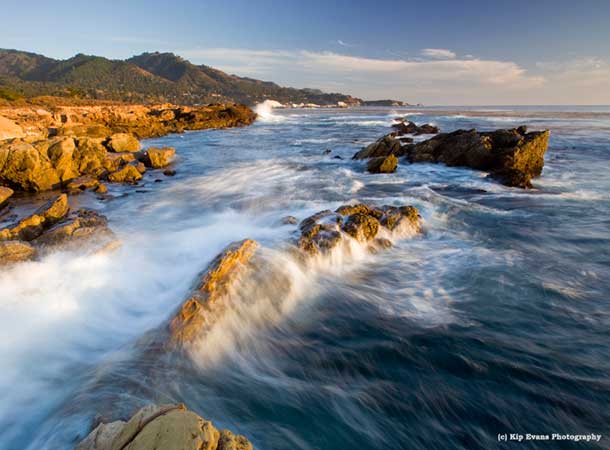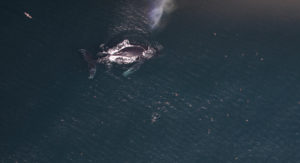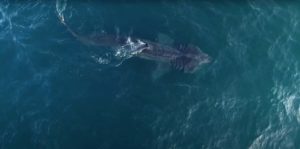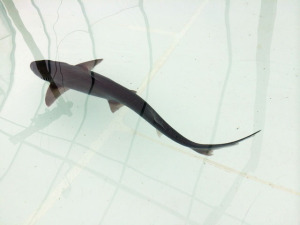A film festival about the ocean doesn’t have to look far for charisma: Certain toothy creatures and wave-riding daredevils will easily draw audiences. But the San Francisco Ocean Film Festival, now in its eighth year, aspires to do more than just fill seats. “I would hope that people walk away with a better understanding of the ocean and its fragility,” says festival director Ana Blanco, “and what they can do to become better stewards of the ocean.”
That ambition to balance “entertainment and education,” as Blanco puts it, will play out from March 9-13 at Theatre 39 on Pier 39. Surfboards and killer whales will share the screen with portraits of the ocean’s most pressing needs. The line-up includes 55 films and 33 visiting filmmakers, as well as two panel discussions, an awards ceremony, and an opening night party. “It’s everything to do with the ocean and how we interact with it,” says Blanco.
Two issues will receive special attention. On Friday, March 11, in the afternoon, a program dedicated to “International Marine Protected Areas” will feature three films on the subject followed by an expert roundtable. On Saturday, March 12, a similar event will shed light on “Sharks and Vanishing Marine Life.”
The latter topic has received considerable attention recently thanks to proposed legislation that would prohibit the sale or possession of shark fins, considered a delicacy in Chinese culture. David McGuire, who sponsored Assembly Bill 376 through his non-profit Sea Stewards, helped select the films and panelists for Saturday’s program. He says the bill won’t be the only item on the agenda. “The panel incorporates a discussion on legislation, as well as the cultural argument surrounding it,” he explains. “But it’s actually about the issue of threats to sharks at large.”
Those threats include longline and trawl fishing, where sharks may get caught in hooks and nets meant for other species. But McGuire says the greatest danger comes from finning–removing a shark’s fins and throwing its body back in the sea. Federal law bans the practice on American ships, but imported and pre-processed fins remain unregulated. And demand for expensive shark fin soup keeps the product on shelves and menus in California.
“You could comfortably say millions of Americans consume shark fin soup each year,” says McGuire. With adverse effects on shark populations, he believes: “There’s devastating evidence that we’re really losing.” But the proposed law could relieve the problem. “By making it illegal, everybody’s going to make a different kind of soup,” he says. “There are equally illustrious and good tasting and expensive dishes.”
That conversation will be parsed in full on Saturday’s panel, which brings together perspectives from people involved in conservation, restaurants, aquariums, and media. Confirmed guests include Peter Knights (Director of Wild Aid), Chris Bauer (producer for KQED’s Quest science program), Christina Slager (Director of Husbandry at Aquarium of the Bay), Jennifer Fearing (Chief Economist and California Senior State Director of the Humane Society of the United States), and others. McGuire will moderate the panel. “It’s an opportunity for the public to engage in the discussion,” he says.
The same applies to Friday’s panel, which will address Marine Protected Areas (MPAs). These government-designated entities do at sea what state parks do on land: protect whole territories rather than individual species. That makes them particularly promising for ocean conservation, as filmmaker Kip Evans explains. “They are a really good habitat protection, instead of just species protection,” he says. I think one of the mistakes we’ve made in this country is to protect species in decline, instead of addressing the issues around why the salmon, for example, are disappearing.”
The United States has more than 300 MPAs, and California is currently implementing a state-wide network of them. But with government budget cuts, the future of MPAs remains unclear. “There’s some problems associated with finding the funding to run them,” says Evans. “I know that Governor Brown’s office is looking at ways to cut the budget, and we want to make sure that the Marine Protected Areas don’t get cut.”
To that end, Evans made a film called “A Wave of Change,” about the state’s MPA system. It is shown in state park visitor’s centers along the Central California Coast, as well as in schools and at various environmental events. It will be screened on Friday afternoon, along with a panel and other films Evans helped select.
Blanco singled out one of the submissions, “Loretanos: Diseñando el Futuro del Mar,” or “Designing the Ocean’s Future,” which depicts a citizen-led effort to establish government protection in Loreto Bay, off the coast of Baja. The grassroots conservation model could be used elsewhere in Mexico and in the United States. “The idea is to use the film to start a conversation,” says Blanco, “and welcome the community to become a part of that dialogue.”
Evans invited the director of Loreto Bay National Park to join the panel, along with two other speakers from Mexican conservation programs. With the presence of American professionals like the California Department of Fish and Game’s Marine Life Protection Act Program Manager, a cross-border dialogue should ensue.
“I’m hoping that there’ll be an exchange of ideas between our California experts and our Mexican experts,” says Evans, “a sharing of trials and tribulations.” But he expects attendees will also benefit. “I think letting people know the importance and the urgency of this issue is one thing that will be good,” he says, “and just hearing an international perspective, which we don’t get very often.”
For a full schedule and tickets, visit oceanfilmfest.org.

.jpg)




-300x221.jpg)